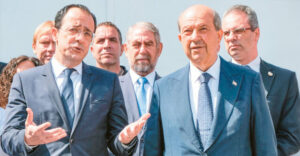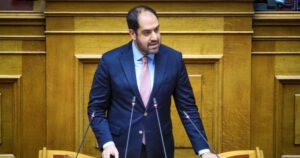With his cards tightly closed, UN Secretary General Antonio Guterres is receiving Cypriot President Nikos Christodoulides and Turkish Cypriot leader Ersin Tatar for an informal dinner that will determine whether the process will continue or another attempt to restart the Cyprus talks will be closed before they even begin.
The destabilization in the Eastern Mediterranean and the Middle East region is creating pressure for a solution to the Cyprus problem, while Athens also believes there should be substantial movement on the issue as it affects Greek-Turkish relations in both directions.
This effort of the UN Secretary General, the result of the mission of his special representative Maria-Angela Algin Quayar, starts with negative moods as the Turkish side has entrenched itself behind the position that sets as a precondition for the resumption of talks the acceptance of sovereign equality and equal international status, essentially the recognition of two states.
Turkey and the Turkish Cypriot leadership since 2021 at the Geneva Plenary have formally adopted this dividing policy and it is telling that Mr Tatar has stated that in the informal dinner the discussion of Federation will be completely absent.
Aggressive rhetoric
The extreme inflexible position adopted by the Turkish side and generally aggressive rhetoric in recent months, including threats against the Republic of Cyprus, significantly limits expectations for a meaningful step leading to a resumption of the Cyprus talks. Despite the fact that Guterres has the card of convening a five-party meeting on his agenda, at this stage he does not want to force a move without preparation, which would lead to a collapse and finalization of the deadlock.
This does not preclude him from attempting to keep a process alive by proposing the consideration of a small package of issues including, for example, security and internal governance. Further complicating an already difficult climate, Mr Tatar reiterated his statements on Varosha on the fourth anniversary of the illegal opening of the enclosed area that the plan now is to demolish certain buildings, with the aim, he says, of “constructing other buildings in their place for the economic exploitation of the area.”
Athens, over-optimistically, believes that the improved climate in Greek-Turkish relations is also working positively for the Cyprus problem. However, this is not proven in practice as both in Greek-Turkish and Cyprus issues Turkey has not moved an inch from its provocative positions; on the contrary, there is a widening of its claims.
Christodoulides had from the beginning of his term of office set the resumption of talks as his goal, but of course he is bound in terms of negotiating positions by both the decisions of the National Council and the positions of the parties supporting the government, since DIKO and EDEK have a hard line on the Cyprus dispute.
Guterres has the ability to manoeuvre both the process and the substance of the talks, and so is seen as having planned a move that he will present directly to both sides.
However, the Cypriot side is ready for any surprise: the Cypriot President will not accept any process that does not have a clear reference to the framework and principles of a Cyprus solution on the basis of the federal model. At the same time, he will reject any attempt by the UN Secretary General to meet the Turkish side’s demand for the provision of certain measures to be taken for the benefit of Turkish Cypriots either in exchange for their acceptance of the start of talks or as compensation if this process also fails.
And in this way to reintroduce the Turkish side’s proposal for direct flights, direct trade and direct international relations, which are elements of recognition of the pseudo-state. This would of course be an incentive for the Turkish Cypriots to drive the process to a dead end.
Guterres’ ambitions
Guterres in his last year in office wants there to be even virtual progress on Cyprus not only for reasons of posterity, but also because he wants to support the candidacy of his special representative on Cyprus, Maria-Angela Algin Quayar, as his successor as UN secretary-general. A success for Ms. Algin, even if it means a resumption of the Cyprus process that has been unresolved for half a century, would be a strong card for her candidacy.
As far as Turkish intentions are concerned, however, apart from the hard line that has been adopted, there is likely to be a wait-and-see attitude at least until the elections in the pseudo-state in the spring of 2025 as there is an assessment that Mr Tatar, who has little chance of renewing his term, has no room for manoeuvre as circumstances too often require in such talks.
For Ankara, however, it is particularly problematic that significant steps have been taken to upgrade the Republic of Cyprus’ geostrategic role and strengthen its relations not only with the US but also with countries of the Arab world. In particular, the agreements on a roadmap for US-Cyprus military cooperation and the extension for another year of the lifting of restrictions on the sale of defence equipment by the US have infuriated the Turkish leadership, which has gone so far as to denounce Washington for undermining the prospects for a Cyprus settlement and for allegedly threatening the security of Turkish Cypriots.
Ask me anything
Explore related questions





